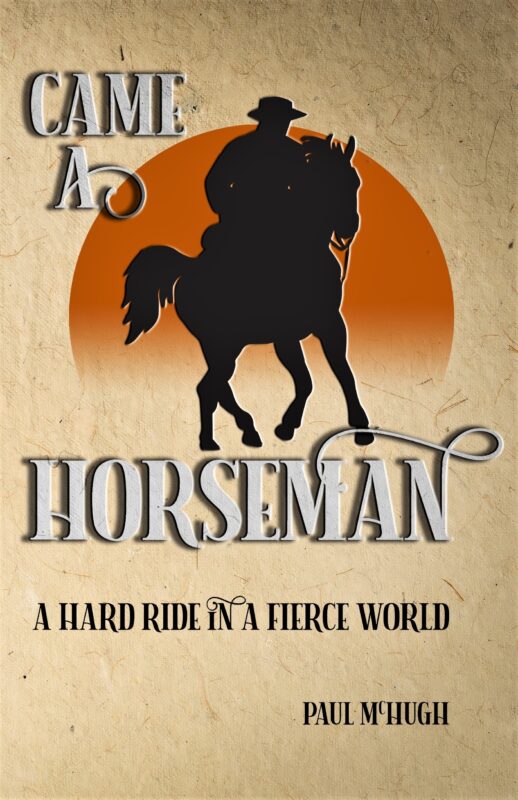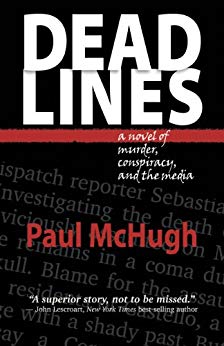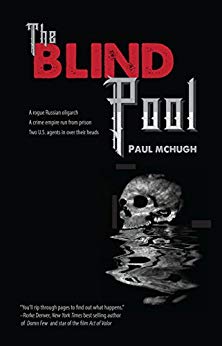Outdoors freelancer Paul McHugh (center, kneeling) with companions after a weeklong rock climbing seminar with the Yosmite Mountaineering School

Anyone who can be talked out of it, should be.
That’s a theme of the apocryphal anecdote I’m about to relate to you.
“Apocryphal” here means that both the content and provenance of this story should be regarded as a tad dubious, and so taken with a grain – or a teaspoon – of salt.
Nevertheless, the tale is worth relating, as it holds a valuable moral.

Decades ago, the Southern writer Erskine Caldwell was scheduled to speak to a host of aspiring student writers at Chapel Hill, North Carolina. All were eager to hear what tips or advice such a highly successful (if salacious and controversial) author might convey. All hoped to feel encouraged and boosted toward a similar luminous career.
But here’s what Caldwell said. “Don’t try to be a writer. It shall break your heart and threaten your sanity. If you’ve got any brains, become a doctor or a lawyer. Then at least you’ll be able to make a living and help people. If you’re not quite that bright, become a carpenter, a mechanic or a plumber. Then you’ll be able to see the work of your hands bear some tangible fruit. But whatever you do, keep well away from pen and paper. Never let yourself imagine that scribbling some crap down somewhere will ever lead to anything but frustration and poverty.”

I’m paraphrasing here, from memory. I’ve no written record of Caldwell’s historic presentation close to hand. But I do aver that I’ve accurately rendered its gist. I remember thinking as I read an account of his talk at the time, “Damn. That’s brilliant!”
Because anyone who can be talked out of trying to be a writer should be talked out of it.
Only those who have a profound and visceral surge of feeling that compels them to reject all and any discouragement – à la, “Screw you, Caldwell, I’m going for it, and not only that, I’ll be more brilliant and successful at it than you ever dreamed of being!” – will have a decent chance of making it. An aspiring scribbler must wade through successive droughts of inspiration and doubts about capability, the sheer drudgery of the work, and a daunting gantlet of rejection. That’s on a good day.
Yet, perhaps this remains true of all the art forms. Anyone who lacks passion need not apply.
Cast your tail out upon the waters

To describe the period when I began a writing career as a mere hand-to-mouth existence doesn’t overstate my case by much. I never got to the point of having to munch my own fingernails for lunch, but I did come rather close! I recall the day I was down to $1.65. I went to the café near the country cabin where I lived at the time and bought a newspaper and a cup of coffee. Then I was down to sixteen cents. After that, I went to the village post office, opened my box, and discovered a check waiting for me in the amount of $3,000 – payment for some of the previous year’s work.
My point here is that freelance writing can be quite the trapeze act. And you never know whether your catcher is going to be nicely in synch, or whether you’ll need to trust to the strength of a net that might or might not be in its proper spot below you. It takes a great deal of faith to keep on swinging and flying amid such circumstance, and I often thought back to Caldwell’s warning. Seven years passed for me in this fashion. That’s about the same length of time Caldwell spent establishing himself at an outpost in Maine, amid the Depression. He survived by writing book reviews for pocket change, and then selling the review copies in his own tiny bookstore.
I had several rules or maxims for freelancing that I stretched like a gossamer apron over my abyss of penury. The first was that I would gather all my possible motivation in one place by only living on the money I could make from writing, and I would do this for at least three years. If I was still starving at the end of that time, I’d quit and do something else. After I succeeded in making that deadline, I gave myself another five years to prosper beyond a basic survival level.
Honing the tip of your lance

As that began to occur, I developed a few other principles, ones that a freelancer might find useful even in today’s fraught market. (Let us note that markets have likely never seemed un-fraught to freelancers at any time!)
- It’s not just about how much you make, it’s also about how much you can do without.
- It’s not just whether or not you can sell a story, it’s how many times you can sell almost exactly the same story.
- When you sell your stories, you must always be selling yourself as well. Charm is an asset. At minimum, strive not to be any sort of boor.
- Keep all your notes and photos and build extensive files. Think up new ways to exploit these things; take fresh lines through old material.
- Define your area of expertise, and make sure that every possible contact knows about it. When editors think of any topic that’s related, they should also think of you.
- Assignments are treasures and you should treat them that way. Make your deadlines, and always turn in clean stuff. Save editors time and trouble, and they’ll prove much more willing to haul your butt out of a jam with a fresh assignment, kill fee or expense account approval.
Hunt, gather, repeat
My area of expertise was deep green. I don’t even mean that in a metaphorical sense. Topics I loved to cover included: outdoor sport, resource use, environment, adventure and travel. That was because I’d grown up in a rural setting, intimate with nature. So, I felt far more comfortable out in the woods than in any urban zone. And when I was in the sticks, I could see stories going by that few others were writing about at the time. That spelled opportunity.

By way of example: I was on a wilderness camping trip when a companion got bitten by a rattlesnake. I caught the snake, gave the victim first aid and transported him to medical care. I harvested a half-dozen stories out of that episode. I worked as logger, a “puller” on a salmon boat, and a ranch hand and wrote about all three of those worlds. I worked “the crush” in Napa Valley as a grape hauler, then milked several magazine cover stories out of the gig. I learned to cross-country ski, rock climb, and scuba dive then wrote stories about them all.

For a short while I was a feature writer for a national newspaper syndicate. During that period, I got the brainstorm of writing a series about taking a trip back home for Christmas – all the way across the country, and by a wide array of means. I took a gamblers’ bus to Reno, rode the rails to Salt Lake, hitchhiked to Aspen, and so forth, filing stories about the people I met along the way. Still own a relic from that project: a giant hand with an upraised thumb that I used to hitch. I recall seeing a pair of truckers doubled over in their cab with laughter as they caught sight of my giant hand. Next, they pulled their semi over to the curb of a Denver on-ramp to pick me up.
Downside of the upside

I found plenty about my scribbling apprenticeship to like, especially its vast freedoms. I felt myself the utter master of my agenda. I could wander at will, moving like the last of the hunter-gatherers across the landscape, writing about whatever drew my attention or charmed my soul. But I must admit that, increasingly, I found some things to not like about this line of work – such as the number of years I had to go without good dental care, or the sad way I had to count my pennies before taking a lady out on the town.
Meanwhile, somewhat beyond my ken, good karma had steadily accumulated.

In the San Francisco Bay Area, a journalism juggernaut rolled onward called the Chronicle/Examiner Sunday edition, where the region’s two leading papers combined forces to turn out a weekend paper thick enough to kindle a bonfire or choke a sperm whale. The paper held three Sunday magazines, and I wrote regularly for two of them.

This meant occasional trips to The City to confer with editors. I would go to the legendary corner of 5th and Mission, take a walnut-paneled elevator up to the news floor, wander past all the cluttered desks and chattering reporters, and work out my assignments. Then I’d go a block south to the M&M watering hole and marvel at the old front page veloxes on display as wall poster art, the ink-stained pressmen thumping their cups of liars’ dice on the bar, and cigar-chomping newspaper vets like Carl Nolte hanging out to gossip with their cronies. I’d sip a glass of draft ale and enjoy the view and wonder what supreme, additional exertions I’d have to undertake to ever join this boisterous and attractive media gang.
As it turned out, not much.
From the bilge to the bridge
The Chronicle decided to launch a new Outdoors Section and had been looking for someone to become its star feature writer. Suddenly, I found myself in the right place at the right time with the right background. I plopped a huge carboard box holding all my clips from the previous seven years onto the desk of the Chron’s chief editor. He rummaged through it, raised his eyebrows, nodded. And so, I was hired.
Suddenly, I had a prime slot at a paper with a circulation of 600,000 in its heyday, and a readership of a million. “The Voice of the West.” And I held that post for the next 22 years. I believe that sports writers long have dubbed such a privileged position the catbird seat.
As Louis Pasteur said, “Chance favors the prepared mind.”
Or as the Good Book says – not that one, the I Ching – “Perseverance furthers.”

After Paul McHugh was hired as the lead feature writer for the new Outdoors Section of the San Francisco Chronicle, drift-boat fishing for Chinook salmon on California’s Smith River was one of his first assignments.








